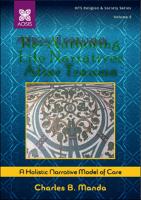Re-Authoring Life Narratives After Trauma
A Holistic Narrative Model of Care
Abstract
Re-authoring Life Narratives after Trauma is an interdisciplinary, specialist resource for traumatic stress researchers, practitioners and frontline workers who focus their research and work on communities from diverse religious backgrounds that are confronted with trauma, death, illness and other existential crises. This book aims to argue that the biopsychosocial approach is limited in scope when it comes to reaching a holistic model of assessing and treating individuals and communities that are exposed to trauma. The holistic model must integrate an understanding of and respect for the many forms of religion and spirituality that clients might have (Pargament 2011). It will not only bring a spiritual perspective into the psychotherapeutic dialogue, but it will also assist in dealing with the different demands in pastoral ministry as related to clinical and post-traumatic settings. The book makes several contributions to scholarship in the disciplines of, although not limited to, traumatic stress studies, pastoral care and counselling, psychology and psychiatry. Firstly, the book brings spirituality into the psychotherapeutic dialogue; traditionally, religious and spiritual topics have not been a welcome part of the psychotherapeutic dialogue. Secondly, it underscores the significance of documenting literary narratives as a means of healing trauma; writing about our traumas enables us to express things that cannot be conveyed in words, and to bring to light what has been suppressed and imagine new possibilities of living meaningfully in a changed world. Thirdly, it proposes an extension to the five-stage model of trauma and recovery coined by Judith Herman.
Keywords
trauma; narrative; narrative model of care; care; death; healing; peopleDOI
10.4102/aosis.2019.BK107Publisher
AOSISPublisher website
https://books.aosis.co.za/index.php/obPublication date and place
Durbanville, 2019Series
HTS Religion & Society Series, 5Classification
Christian life and practice


 Download
Download Web Shop
Web Shop